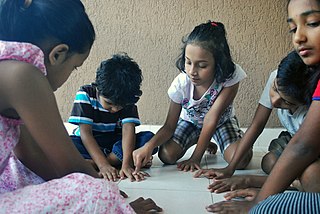
A counting-out game or counting-out rhyme is a simple method of 'randomly' selecting a person from a group, often used by children for the purpose of playing another game. It usually requires no materials, and is achieved with spoken words or hand gestures. The historian Henry Carrington Bolton suggested in his 1888 book Counting Out Rhymes of Children that the custom of counting out originated in the "superstitious practices of divination by lots."

Hangman is a guessing game for two or more players. One player thinks of a word, phrase, or sentence and the other(s) tries to guess it by suggesting letters or numbers within a certain number of guesses. Originally a paper-and-pencil game, there are now electronic versions.

Scrabble is a word game in which two to four players score points by placing tiles, each bearing a single letter, onto a game board divided into a 15×15 grid of squares. The tiles must form words that, in crossword fashion, read left to right in rows or downward in columns and are included in a standard dictionary or lexicon.
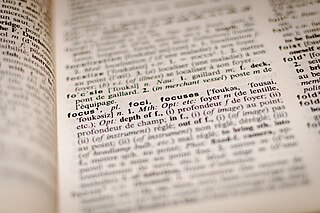
Fictionary, also known as the Dictionary Game or simply Dictionary, is a word game in which players guess the definition of an obscure word. Each round consists of one player selecting and announcing a word from the dictionary, and other players composing a fake definition for it. The definitions, as well as the correct definition, are collected blindly by the selector and read aloud, and players vote on which definition they believe to be correct. Points are awarded for correct guesses, and for having a fake definition guessed by another player.

Balderdash is a board game variant of a classic parlour game known as Fictionary or the Dictionary Game. It was created by Laura Robinson and Paul Toyne of Toronto, Ontario, Canada. The game was first released in 1984 by the Canada Games Company. A US edition appeared that year from TSR, Inc., copyrighted to Gameworks Creations, Inc. and licensed from Canada Games. Subsequent editions have appeared from a variety of companies including The Games Gang, Hasbro and Mattel. The game has sold over 15 million copies worldwide to date. It is aimed at fans of word games, such as Scrabble.

A crossword is a word game consisting of a grid of black and white squares, into which solvers enter words or phrases ("entries") crossing each other horizontally ("across") and vertically ("down") according to a set of clues. Each white square is typically filled with one letter, while the black squares are used to separate entries. The first white square in each entry is typically numbered to correspond to its clue.
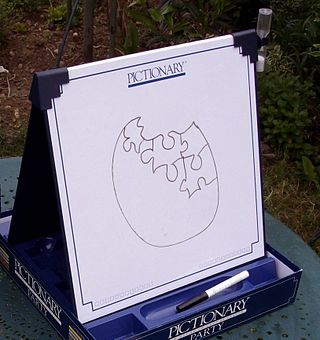
Pictionary is a charades-inspired word-guessing game invented by Robert Angel with graphic design by Gary Everson and first published in 1985 by Angel Games Inc. Angel Games licensed Pictionary to Western Publishing. Hasbro purchased the rights in 1994 after acquiring the games business of Western Publishing. Mattel acquired ownership of Pictionary in 2001. The game is played in teams with players trying to identify specific words from their teammates.

Boggle is a word game in which players try to find as many words as they can from a grid of lettered dice, within a set time limit. It was invented by Allan Turoff and originally distributed by Parker Brothers.

In the United States and Canada, bingo is a game of chance in which each player matches the numbers printed in different arrangements on cards. The game host draws balls at random, marking the selected numbers with tiles. When a player finds that the selected numbers are arranged on their card in a horizontal, vertical, or diagonal line, they call out "Bingo!" to alert all participants to a winning card, which prompts the game host to examine the card for verification of the win. Players compete against one another to be the first to have a winning arrangement for the prize or jackpot. After a winner is declared, the players clear their number cards of the tiles and the game host begins a new round of play.

Pig is a simple, collecting card game of early 20th century American origin suitable for three to thirteen players that is played with a 52-card French-suited pack. It has two very similar and well known variants – donkey and spoons. It is often classed as a children's game. It may be descended from an old game called vive l'amour.

Jotto is a code-breaking pen and paper word game for two players. Each player picks and writes down a secret word and attempts to guess the other's word first during their turn.

Catch Phrase is a word guessing party game commercially available from Hasbro.
MASH is a multiplayer paper-and-pencil game commonly played by children intended to predict one's future. The name is an acronym of "Mansion, Apartment, Shack/Street/Shed/Sewers/Swamp, and House". Additional variations include adding a potential car, future spouse, and ultimate career choice, among the numerous other possible categories.
The 1983–84 NHL season was the 67th season of the National Hockey League. The Edmonton Oilers de-throned the four-time defending Stanley Cup champion New York Islanders four games to one in the Cup finals.
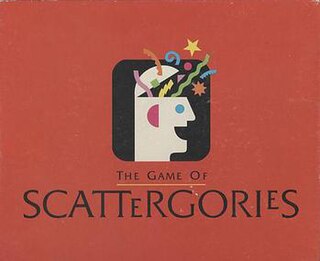
Scattergories is a creative-thinking category-based party game originally published by Milton Bradley in 1988. The objective of the 2-to-6-player game is to score points by uniquely naming objects, people, actions, and so forth within a set of categories, given an initial letter, within a time limit. The game is based on a traditional game called Categories.
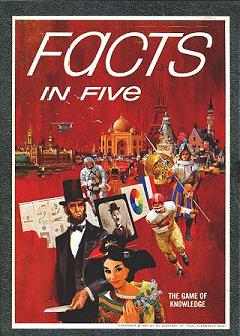
Facts in Five: The Game of Knowledge is a trivia game for two or more players, designed in 1964 by Rick Onanian.

In game theory, a simultaneous game or static game is a game where each player chooses their action without knowledge of the actions chosen by other players. Simultaneous games contrast with sequential games, which are played by the players taking turns. In other words, both players normally act at the same time in a simultaneous game. Even if the players do not act at the same time, both players are uninformed of each other's move while making their decisions. Normal form representations are usually used for simultaneous games. Given a continuous game, players will have different information sets if the game is simultaneous than if it is sequential because they have less information to act on at each step in the game. For example, in a two player continuous game that is sequential, the second player can act in response to the action taken by the first player. However, this is not possible in a simultaneous game where both players act at the same time.

Scrabble Showdown is an American game show created for the American cable network The Hub. The program was based on the board game Scrabble and was hosted by Justin Willman. It ran from September 3, 2011, to April 15, 2012.
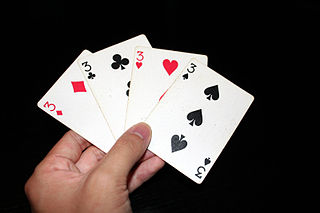
Kemps is a matching card game for two to six teams of two players each, where each player must secretly communicate to their partner when they have four matching cards in their hand. The game is a "cross between Commerce and Authors" with the unusual feature of partnership play. This "party classic" is also known as Canes, Cash and Kent. It appears to be a 21st century game played in America, France and Switzerland (known there as Gemsch or Gämsch, but its origin is unclear.


















